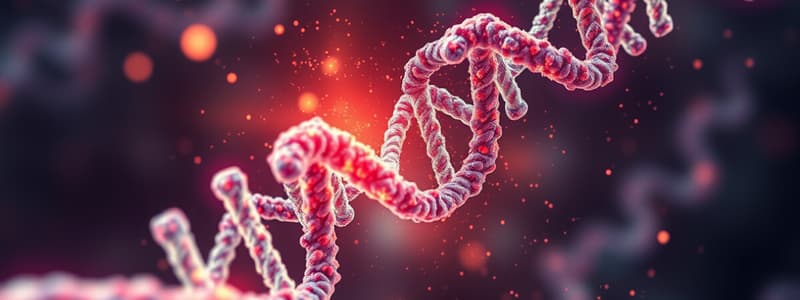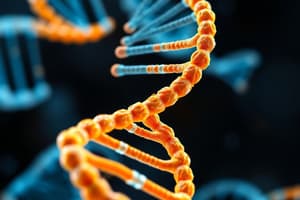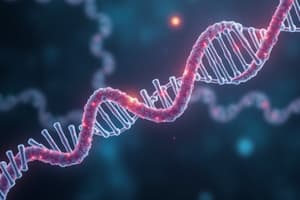Podcast
Questions and Answers
What is the role of dehydration synthesis in the formation of triacylglycerol?
What is the role of dehydration synthesis in the formation of triacylglycerol?
- It links fatty acids to glycerol by forming ester linkages. (correct)
- It alters the polarity of triglyceride molecules.
- It introduces double bonds in fatty acids.
- It breaks down fatty acids into smaller units.
Which statement accurately describes the physical state of triglycerides at room temperature?
Which statement accurately describes the physical state of triglycerides at room temperature?
- Triglycerides are non-polar and always dissolve in water.
- Triglycerides are always solids due to their saturation.
- Triglycerides from plants are solid at room temperature.
- Triglycerides can be either liquid or solid depending on the fatty acid composition. (correct)
What distinguishes saturated fatty acids from unsaturated fatty acids?
What distinguishes saturated fatty acids from unsaturated fatty acids?
- Unsaturated fatty acids contain no double bonds.
- Saturated fatty acids contain only single bonds in their hydrocarbon chains. (correct)
- Unsaturated fatty acids have only single bonds between carbon atoms.
- Saturated fatty acids contain no hydrogen atoms.
How do triglyceride molecules behave when placed in water?
How do triglyceride molecules behave when placed in water?
Which of the following is true about the fatty acids in a triglyceride?
Which of the following is true about the fatty acids in a triglyceride?
What are the characteristics of polyunsaturated fatty acids?
What are the characteristics of polyunsaturated fatty acids?
Which of the following best describes the orientation of phospholipid molecules at an oil-water interface?
Which of the following best describes the orientation of phospholipid molecules at an oil-water interface?
What is the role of cholesterol in the human body?
What is the role of cholesterol in the human body?
What is the primary difference between saturated and unsaturated fatty acids?
What is the primary difference between saturated and unsaturated fatty acids?
Which of the following hormones is derived from cholesterol?
Which of the following hormones is derived from cholesterol?
Which of the following statements about lipids is NOT true?
Which of the following statements about lipids is NOT true?
What is the main structural difference between fats and oils at room temperature?
What is the main structural difference between fats and oils at room temperature?
What role do steroids and modified fatty acids play in biological systems?
What role do steroids and modified fatty acids play in biological systems?
Which type of lipid is primarily responsible for providing thermal insulation?
Which type of lipid is primarily responsible for providing thermal insulation?
Which part of a fatty acid makes it an acid?
Which part of a fatty acid makes it an acid?
What characterizes triglycerides among lipids?
What characterizes triglycerides among lipids?
How do lipids differ from other organic compounds?
How do lipids differ from other organic compounds?
In the context of biological functions, carotenoids are primarily known for what role?
In the context of biological functions, carotenoids are primarily known for what role?
Which statement accurately describes a key structural difference between RNA and DNA?
Which statement accurately describes a key structural difference between RNA and DNA?
What is the significance of hydrogen bonds in the structure of DNA?
What is the significance of hydrogen bonds in the structure of DNA?
Why is starch considered more digestible than cellulose?
Why is starch considered more digestible than cellulose?
Which bases are classified as purines in RNA?
Which bases are classified as purines in RNA?
What role do carbohydrates primarily serve in cells?
What role do carbohydrates primarily serve in cells?
What is the main reason certain elements are considered essential for life?
What is the main reason certain elements are considered essential for life?
What distinguishes fibrous proteins from globular proteins?
What distinguishes fibrous proteins from globular proteins?
Which is a characteristic feature of the composition of RNA?
Which is a characteristic feature of the composition of RNA?
What are the primary functions of nucleic acids?
What are the primary functions of nucleic acids?
Which component is unique to nucleotides when compared to nucleosides?
Which component is unique to nucleotides when compared to nucleosides?
What sugar is found in RNA, differentiating it from DNA?
What sugar is found in RNA, differentiating it from DNA?
What type of bond links the nucleotides within a nucleic acid strand?
What type of bond links the nucleotides within a nucleic acid strand?
In which direction do nucleic acids grow as they form?
In which direction do nucleic acids grow as they form?
Which statement about the components of nucleotides is incorrect?
Which statement about the components of nucleotides is incorrect?
What is the role of the phosphate group in a nucleotide?
What is the role of the phosphate group in a nucleotide?
Which of the following statements about DNA and RNA structure is true?
Which of the following statements about DNA and RNA structure is true?
Flashcards are hidden until you start studying
Study Notes
Ribose and Nucleic Acids
- Ribose is the pentose sugar found in RNA; deoxyribose is in DNA.
- RNA is typically single-stranded, while DNA is double-stranded.
- RNA bases: Adenine (A), Guanine (G), Cytosine (C), and Uracil (U).
- DNA bases: Adenine (A), Guanine (G), Cytosine (C), and Thymine (T).
- Base-pairing occurs in DNA via hydrogen bonds between purines and pyrimidines.
Chemical Basis of Life
- Life is composed of unique atoms forming essential elements represented in the Periodic Table.
- Some elements are essential for life, and the chemicals of life are uniform across living organisms.
Fats and Carbohydrates
- Fats serve as more energy-dense stores than carbohydrates.
- Carbohydrates are primary energy sources for cells.
- Under conditions of carbohydrate depletion, fats can provide energy.
Starch vs. Cellulose
- Both are glucose polymers; starch is a branched polymer, while cellulose is linear, affecting digestibility.
- Starch is digestible; cellulose is not due to structural differences.
Lipids Overview
- Lipids include fats, oils, phospholipids, and cholesterol; they are organic compounds primarily composed of C, H, and O.
- Lipid H:O ratio exceeds 2:1; building blocks include fatty acids and glycerol.
- They do not form polymers but are larger molecules made of smaller units.
Biological Functions of Lipids
- Fats and oils are primarily for energy storage.
- Waxes and oils provide protective coatings and act as water barriers.
- Phospholipids form structural and recognition components of cell membranes.
- Carotenoids assist in light acquisition for photosynthesis.
- Steroids like cholesterol play regulatory roles within cells.
Fatty Acids
- Saturated fatty acids have no double bonds, while unsaturated fatty acids have one or more double bonds.
- Saturated fats are typically solid at room temperature; unsaturated fats are liquid due to poor packing.
- Triglycerides consist of one glycerol and three fatty acids, formed via dehydration synthesis.
Phospholipids
- Composed of glycerol, two fatty acids, and a phosphate group; features hydrophilic heads and hydrophobic tails.
- They organize at oil-water interfaces, forming cell membranes.
Steroids
- Function as signaling molecules; significant types include testosterone and estrogen, regulating sexual development.
- Cholesterol is crucial for membrane structure and hormone synthesis.
Nucleic Acids
- Nucleic acids (DNA and RNA) store and transmit genetic information.
- Nucleotides are made of a pentose sugar, phosphate group, and nitrogen-containing base.
- Nucleic acids grow in the 5′-to-3′ direction, with linkages formed by phosphodiester bonds between nucleotides.
- RNA contains ribose; DNA contains deoxyribose.
Studying That Suits You
Use AI to generate personalized quizzes and flashcards to suit your learning preferences.





